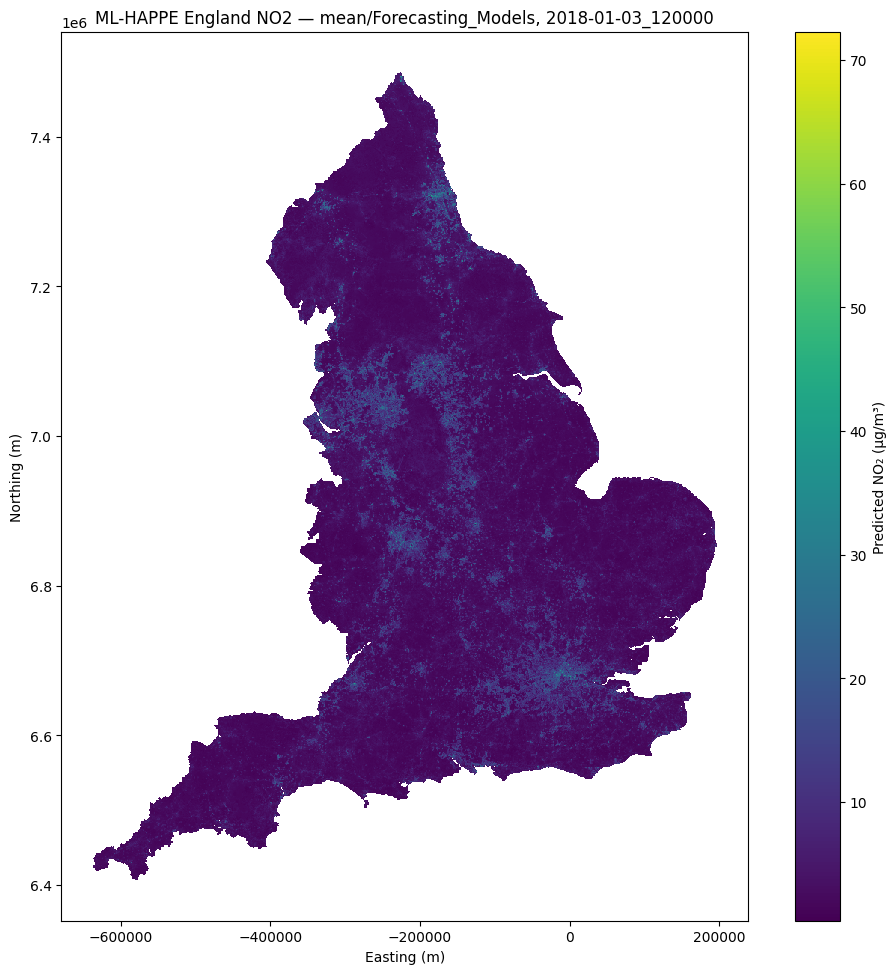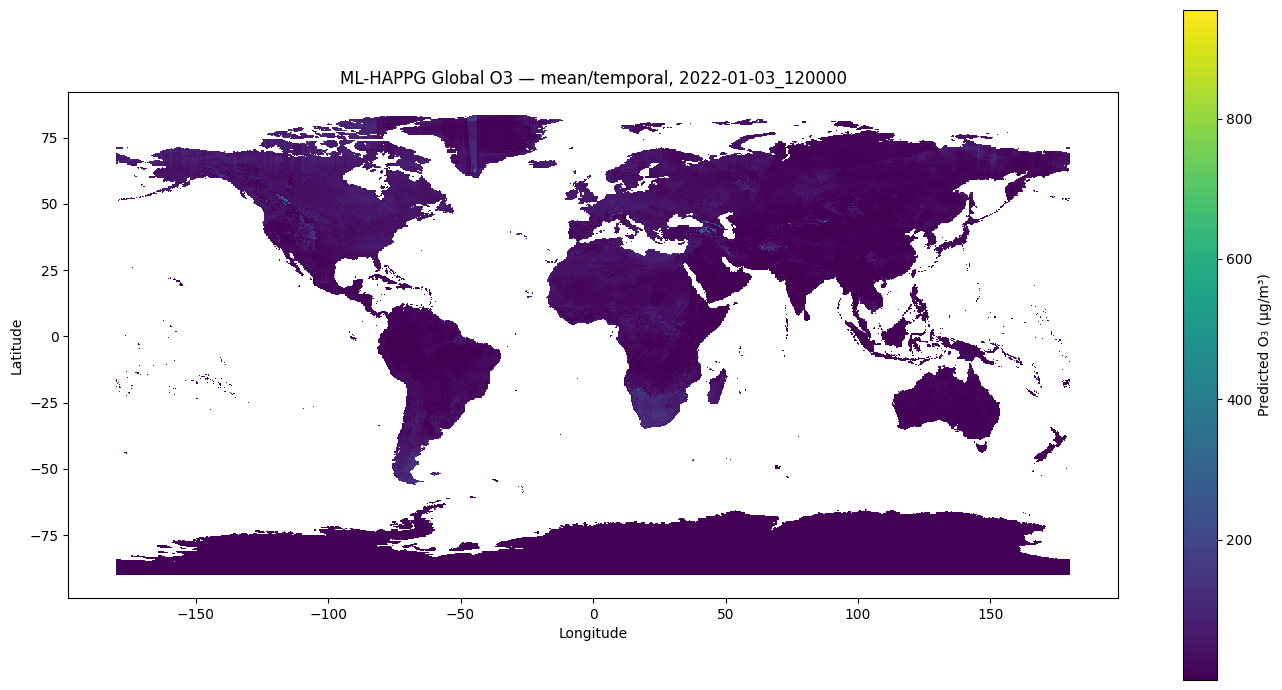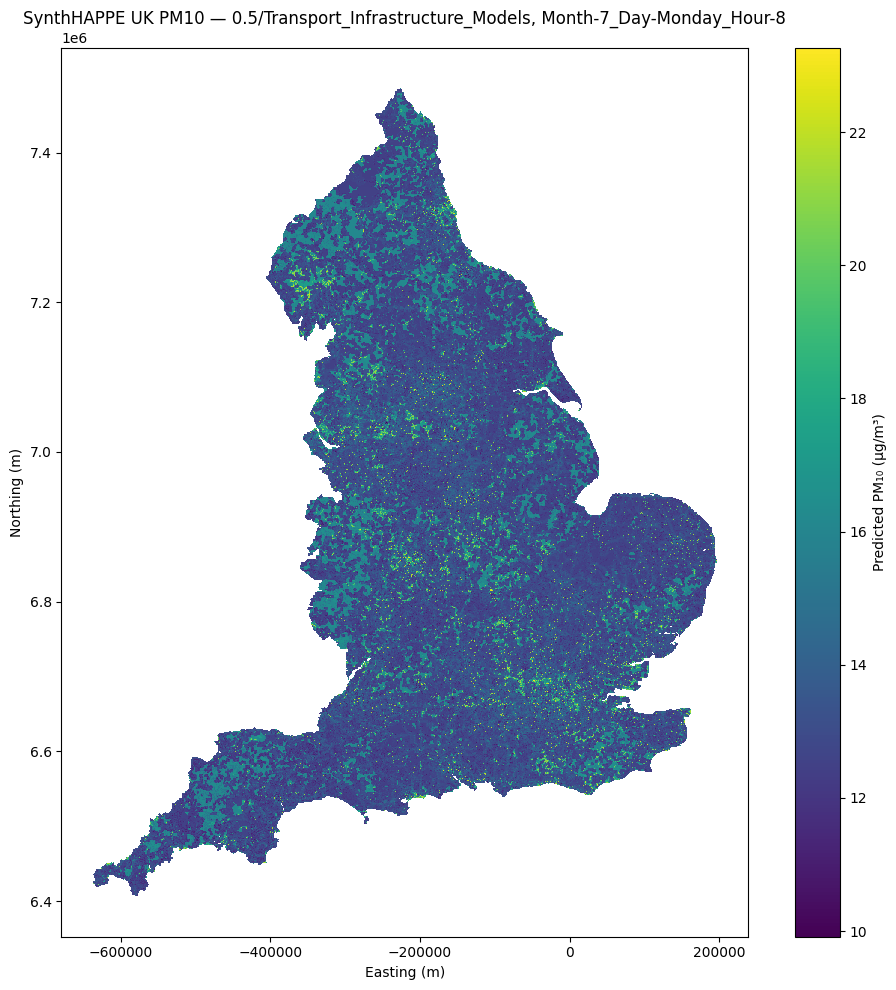Making Predictions#
# ========= ML-HAPPE (UK) — NO2 =========
# Predict & map UK NO2 for a given timestamp like "YYYY-MM-DD_HHmmss"
# Output PNGs are saved to environmental_insights/environmental_insights_visulisations/
import numpy as np
import pandas as pd
import geopandas as gpd
import matplotlib.pyplot as plt
import lightgbm as lgb
from environmental_insights import air_pollution_functions as ei_air_pollution_functions
from environmental_insights import data as ei_data
from environmental_insights import models as ei_models
from environmental_insights import download as ei_download
from environmental_insights import variables as ei_vars
# ----------------------------
# SETTINGS
# ----------------------------
pollutant = "no2"
model_level = "mean"
uk_timestamp = "2018-01-03_120000" # <- underscore format accepted here
# Model category used for ML-HAPPE
uk_model_category = "Forecasting_Models"
# ----------------------------
# 1) Fetch INPUT features at the timestamp
# ----------------------------
X_uk = ei_data.air_pollution_concentration_complete_set_real_time_united_kingdom(
uk_timestamp, data_type="Input"
)
# ----------------------------
# 2) Load the model & select features
# ----------------------------
uk_model = ei_models.load_model_united_kingdom(
model_level=model_level,
pollutant=pollutant,
model_category=uk_model_category,
)
uk_features = ei_models.get_model_feature_vector("Forecasting")
# ----------------------------
# 3) Predict (returned in concentration units)
# ----------------------------
uk_pred = ei_models.make_concentration_predictions_united_kingdom(
uk_model, X_uk, uk_features
) # -> ["UK_Model_Grid_ID", "Model Prediction"]
# ----------------------------
# 4) Join to UK grid polygons
# ----------------------------
uk_grids = ei_data.get_uk_grids()
uk_map = uk_grids.merge(uk_pred, on="UK_Model_Grid_ID", how="left")
# ----------------------------
# 5) Plot full polygons instead of scatter points
# ----------------------------
uk_map_gdf = gpd.GeoDataFrame(uk_map, geometry="geometry", crs="EPSG:27700")
fig, ax = plt.subplots(figsize=(10, 10))
uk_map_gdf.plot(
ax=ax,
column="Model Prediction",
cmap="viridis",
linewidth=0,
legend=True,
legend_kwds={"label": f"Predicted {ei_vars.replacePollutantName.get(pollutant, pollutant.upper())} (μg/m³)"},
)
ax.set_title(f"ML-HAPPE England {pollutant.upper()} — {model_level}/{uk_model_category}, {uk_timestamp}")
ax.set_xlabel("Easting (m)") # EPSG:27700 X
ax.set_ylabel("Northing (m)") # EPSG:27700 Y
ax.set_aspect("equal") # keep metres square, no flip/distortion
plt.tight_layout()
plt.show()
Model loaded successfully from /Users/lb788/Documents/EI/Environmental-Insights/environmental_insights/environmental_insights_models/ML-HAPPE/Models/mean/no2/All_Stations/no2_Forecasting_Models/model_booster.txt and /Users/lb788/Documents/EI/Environmental-Insights/environmental_insights/environmental_insights_models/ML-HAPPE/Models/mean/no2/All_Stations/no2_Forecasting_Models/model_params.json

# ========= ML-HAPPG (GLOBAL) — O3 =========
# Predict & map global O3 for a given timestamp like "YYYY-MM-DD_HHmmss"
# Plot global model grid polygons in EPSG:4326
import numpy as np
import pandas as pd
import geopandas as gpd
import matplotlib.pyplot as plt
import lightgbm as lgb
from environmental_insights import data as ei_data
from environmental_insights import models as ei_models
from environmental_insights import variables as ei_vars # pretty pollutant label
# ----------------------------
# SETTINGS
# ----------------------------
pollutant = "o3"
model_level = "mean"
global_timestamp = "2022-01-03_120000" # <- underscore format
model_category = "temporal" # ML-HAPPG temporal path
token = None
# ----------------------------
# 1) Fetch GLOBAL INPUT features at the timestamp
# ----------------------------
X_g = ei_data.air_pollution_concentration_complete_set_real_time_global(
global_timestamp, data_type="Input"
) # flat DataFrame keyed by Global_Model_Grid_ID
# ----------------------------
# 2) Rename columns to what the GLOBAL model expects
# ----------------------------
X_g = ei_models.rename_global_input_columns(X_g)
# ----------------------------
# 3) Load the GLOBAL model (Temporal → special layout in ML-HAPPG)
# ----------------------------
g_model = ei_models.load_model_global(
model_level=model_level,
pollutant=pollutant,
model_category=model_category,
token=token
)
# ----------------------------
# 4) Select features FROM THE MODEL (not variables.py)
# ----------------------------
if isinstance(g_model, lgb.Booster):
booster = g_model
elif hasattr(g_model, "booster_") and isinstance(g_model.booster_, lgb.Booster):
booster = g_model.booster_
elif hasattr(g_model, "_Booster") and isinstance(g_model._Booster, lgb.Booster):
booster = g_model._Booster
else:
raise RuntimeError("Could not access LightGBM Booster to read feature names.")
model_features = list(booster.feature_name())
feature_names = [f for f in model_features if f in X_g.columns]
if not feature_names:
raise KeyError("No overlap between model features and input columns.")
# ----------------------------
# 5) Predict using the GLOBAL helper (returns ['Global_Model_Grid_ID','Model Prediction'])
# ----------------------------
g_pred = ei_models.make_concentration_predictions_global(
estimating_model=g_model,
observation_data=X_g,
feature_names=feature_names
)
# ----------------------------
# 6) Join to GLOBAL grid polygons (EPSG:4326) and plot the grid
# ----------------------------
global_grids = ei_data.get_global_grids() # geometry in EPSG:4326
global_map = global_grids.merge(g_pred, on="Global_Model_Grid_ID", how="left")
global_map_gdf = gpd.GeoDataFrame(global_map, geometry="geometry", crs="EPSG:4326")
fig, ax = plt.subplots(figsize=(14, 7))
global_map_gdf.plot(
ax=ax,
column="Model Prediction",
cmap="viridis",
linewidth=0,
legend=True,
legend_kwds={
"label": f"Predicted {ei_vars.replacePollutantName.get(pollutant, pollutant.upper())} (μg/m³)"
},
)
ax.set_title(f"ML-HAPPG Global {pollutant.upper()} — {model_level}/{model_category}, {global_timestamp}")
ax.set_xlabel("Longitude")
ax.set_ylabel("Latitude")
ax.set_aspect("equal")
plt.tight_layout()
plt.show()
Model loaded successfully from /Users/lb788/Documents/EI/Environmental-Insights/environmental_insights/environmental_insights_models/ML-HAPPG/Models/mean/temporal/o3/model_booster.txt and /Users/lb788/Documents/EI/Environmental-Insights/environmental_insights/environmental_insights_models/ML-HAPPG/Models/mean/temporal/o3/model_params.json

# ========= SynthHAPPE (UK Typical-Day) — PM10 =========
# Predict & map UK PM10 for a (Month, DayOfWeek, Hour) slice
# Plot grid polygons in native EPSG:27700 (British National Grid)
import geopandas as gpd
import matplotlib.pyplot as plt
from environmental_insights import data as ei_data, models as ei_models
from environmental_insights import variables as ei_vars # for pretty pollutant label
# ----------------------------
# SETTINGS
# ----------------------------
pollutant = "pm10"
model_level = "0.5"
# Choose a typical-day slice
month = 7 # July
day_of_week = "Monday"
hour = 8 # 08:00
# SynthHAPPE categories: "Climate_Projections_Models" or "Transport_Infrastructure_Policy_Models"
synth_category = "Transport_Infrastructure_Models"
# ----------------------------
# 1) Fetch SynthHAPPE INPUT features for that slice
# ----------------------------
X_synth = ei_data.air_pollution_concentration_typical_day_real_time_united_kingdom(
month=month, day_of_week=day_of_week, hour=hour, data_type="Input"
)
# ----------------------------
# 2) Load the model (UK loader auto-switches under-the-hood for SynthHAPPE categories)
# ----------------------------
synth_model = ei_models.load_model_united_kingdom(
model_level=model_level,
pollutant=pollutant,
model_category=synth_category,
)
synth_features = ei_models.get_model_feature_vector("Transport Infrastructure")
# ----------------------------
# 3) Predict (concentration units) & join to UK grid polygons
# ----------------------------
synth_pred = ei_models.make_concentration_predictions_united_kingdom(
synth_model, X_synth, synth_features
) # -> ["UK_Model_Grid_ID", "Model Prediction"]
synth_map = ei_data.get_uk_grids().merge(synth_pred, on="UK_Model_Grid_ID", how="left")
# ----------------------------
# 4) Plot grid polygons in EPSG:27700 (no reprojection)
# ----------------------------
label_stub = f"Month-{month}_Day-{day_of_week}_Hour-{hour}"
synth_map_gdf = gpd.GeoDataFrame(synth_map, geometry="geometry", crs="EPSG:27700")
fig, ax = plt.subplots(figsize=(10, 10))
synth_map_gdf.plot(
ax=ax,
column="Model Prediction",
cmap="viridis",
linewidth=0,
legend=True,
legend_kwds={
"label": f"Predicted {ei_vars.replacePollutantName.get(pollutant, pollutant.upper())} (μg/m³)"
},
)
ax.set_title(f"SynthHAPPE UK {pollutant.upper()} — {model_level}/{synth_category}, {label_stub}")
ax.set_xlabel("Easting (m)")
ax.set_ylabel("Northing (m)")
ax.set_aspect("equal") # keep metres square, correct orientation
plt.tight_layout()
plt.show()
Downloaded: https://dap.ceda.ac.uk/badc/deposited2025/ML-HAPPE/Models/0.5/pm10/All_Stations/pm10_Transport_Infrastructure_Models/model_booster.txt -> /Users/lb788/Documents/EI/Environmental-Insights/environmental_insights/environmental_insights_models/ML-HAPPE/Models/0.5/pm10/All_Stations/pm10_Transport_Infrastructure_Models
Downloaded: https://dap.ceda.ac.uk/badc/deposited2025/ML-HAPPE/Models/0.5/pm10/All_Stations/pm10_Transport_Infrastructure_Models/model_params.json -> /Users/lb788/Documents/EI/Environmental-Insights/environmental_insights/environmental_insights_models/ML-HAPPE/Models/0.5/pm10/All_Stations/pm10_Transport_Infrastructure_Models
Model loaded successfully from /Users/lb788/Documents/EI/Environmental-Insights/environmental_insights/environmental_insights_models/ML-HAPPE/Models/0.5/pm10/All_Stations/pm10_Transport_Infrastructure_Models/model_booster.txt and /Users/lb788/Documents/EI/Environmental-Insights/environmental_insights/environmental_insights_models/ML-HAPPE/Models/0.5/pm10/All_Stations/pm10_Transport_Infrastructure_Models/model_params.json


